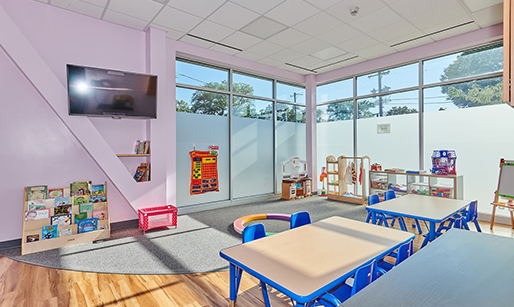
Best Daycares in Chicago in 2024
Are you looking for the best Chicago daycare center for your child? Would you like to know more about the costs, benefits, licensing, and other nuts and bolts of picking the best Chicago daycare facility for your child? If so, you’ve come to the right place!
Research suggests that daycare offers much more than being a great alternative to nanny-care. Many discerning parents opt for daycare because the group setting allows their little ones to thrive socially, emotionally, and developmentally. In addition to freeing up parents to go to work and focus on their adult lives, daycares also set up younger children for success in fast-approaching school life.
However, finding a quality daycare in the Windy City can be a little tricky. With so much to keep in mind and so many options to choose from, we’ve compiled answer to some fundamental questions you’ll want to think about as you consider which kind of daycare is the best fit for your child and your family. And don’t forget to check out our top tips on how to pick the best Chicago daycare for your child.
How Did We Make This List?
Here at Cool Things Chicago, we take your welfare and trust very seriously. When preparing this list, our top priority is to ensure that you get unbiased and accurate advice that can help you make a solid and informed decision about your child’s care. That’s why we have put together a comprehensive 13-point ranking system that keeps your and your child’s needs front and center.
Licensing and Accreditation – Every entry on this list must be a registered daycare provider with the state of Illinois. After all, it’s a general rule of thumb for parents to look for a daycare’s accreditation and licensing. Lucky for you and us, the Illinois Department of Children and Family Services (DCFS) has done much of the heavy lifting. This is the official licensing authority for family daycares, in-home daycares, and traditional daycare centers in Chicago.
DCFS does yearly inspections of all daycare facilities in the state, including those in Chicago. They have also set up a handy searchable database of these daycare providers with information about their licenses, expirations, and any reported violations. For every provider we considered for the list, we did a quick search of the DCFS database.
Accreditation is always a good sign and a stamp of approval from an independent third-party. For all family or in-home daycare facilities, we paid attention to the National Association for Family Child Care (NAFCC), which is the preferred accreditation system in Chicago and nationally. All NAFCC-accredited in-home daycare providers are licensed, received annual training, earned first-aid and CPR certification, and passed a rigorous background screening.
The National Association for the Education of Young Children (NAEYC) is the be-all and end-all of accreditation for non-residential daycare centers. Every center-based daycare provider must be NAEYC-accredited to make it to this list.
Quality – We value what you, the parents, value: a safe and high-quality daycare for your child’s optimal development. That’s why we turned our attention to Excelerate Illinois for reliable quality ratings to further narrow down our list. This state-wide voluntary quality-rating organization uses a four-tier system: Licensed, Bronze, Silver, and Gold Circle of Quality. Of course, the best Chicago daycare centers would boast the Gold Circle of Quality.
Other aspects that we factored in the equation include affordability, caregiver-child ratio, programs offered, and accessibility, among others.
How Does Daycare Work?
Daycare has become an indispensable part of parenting life for most Chicago families, especially for households that need more than one income stream to survive financially. Some parents choose daycare to strike a healthy work-life balance. It’s certainly the best solution for parents who can’t raise a child and work at the same time.
Daycare is typically a facility where parents send their kids to be cared for, entertained, and educated by professional caregivers. They are usually located in or near family-friendly Chicago neighborhoods where children can enjoy playing, socializing, and learning in a safe, quiet, and supportive environment. Even though infants, toddlers, and preschoolers are daycare’s primary targets, some run before-school and after-school care programs for school-going children.
Some of the best Chicago daycare facilities offer childcare centered on philosophies or approaches, such as Bank Street, Christian, Jewish, Montessori, Waldorf, or Reggio Emilia, just to name a few. Similarly, some of them are part of larger national, state, or regional chains like Children’s Lighthouse, Kids R’ Kids, Kiddie Academies, and Primrose, while others are privately-operated.
Both the City of Chicago and the State of Illinois provide parents with access to information about the licensure and violation histories for any daycare facility they are after. Daycares in Chicago fall into two main categories: daycare centers and daycare homes.
Daycare centers are non-residential facilities where parents drop off their kids for care by highly-trained staff. They must be licensed by both the City of Chicago and the Illinois Department of Children and Family Services (DCFS). Designed to accommodate 4-30 children of different ages, from infants to preschoolers, they have qualified teachers who must be at least 19 years of age and with at least two years of training in early childhood education.
Staff and caregivers in a Chicago day care center must also be at least 19, have completed at least 15 hours of training, and have attended at least a year of college or have comparable experience. The center’s director must be older than 21 and have attended at least 2 years of college (or have equivalent experience).
At least one CPR-certified staff member must be present at the daycare center at all times. At the same time, centers that are licensed to cater to infants and newborn babies must have caregivers and staff who are trained in safe sleeping practices.
All licensed Chicago daycare centers must care for younger children (toddlers and infants) in groups separate from preschoolers and older kids. They must also observe state-sanctioned staff-to-child ratio, which is 1:4 for infants aged 6 weeks through 14 months; 1:5 for toddlers aged 15 to 23 months; 1:8 for two-year-olds; 1:10 for three- to five-year-olds, and 1:20 for kids aged 5 and above. If children of different ages are cared for in the same group, the staff-to-child ratio is determined based on the age of the youngest child.
All the best Chicago daycare centers featured on this list have gone the extra mile to meet or exceed strict safety and health standards. They are also required to create a comprehensive curriculum that emphasizes outdoor play and incorporates both active and quiet learning.
When it comes to in-home daycare, Chicago has two types: family daycare and group daycare homes. In either case, you are sending your little one to a warm, familiar, and supportive homey environment. Family daycare homes provide care to groups of up to 12 kids in the provider’s own home, usually with the help of an assistant.
Like traditional daycare centers, these in-home facilities must be licensed and inspected annually, in which case they must be secure and meet strict health and safety standards to pass the inspection. Every caregiver at the daycare home must be aged 18 or above, attend 15 hours of training each year, and have at least a high school diploma. They must also be trained in safe sleeping practices, the Heimlich maneuver, and CPR.
Parents must be permitted to visit the daycare home at any time during active hours, and the site must offer a blend of active and quiet learning with an emphasis on outdoor play. Each caregiver can supervise up to 8 kids under the age of 12 in several different groups.
Group in-home daycares offer care for up to sixteen kids, including those of the provider. Unlike family caregivers, group daycare home caregivers must have attended at least 1 year of college and 15 hours of in-service training annually. They must also be trained in the Heimlich maneuver and CPR.
Each caregiver may take care of up to 8 kids younger than twelve in multiple configurations. Both the primary caregiver and assistant must be at least 21 years of age.
Of course, if group daycare doesn’t sound like your cup of tea, you may consider a babysitter, nanny, or au pair services. These solutions are perfect for parents who want their children to be cared for in their own homes.
How Does Daycare Affect My Child’s Development?
Like most Chicago parents, you may have dozens of questions about daycare racing through your mind. Should I stick to a nanny or switch to a daycare? Does the daycare have any developmental benefits for my little one?
The great news is that several studies suggest that a high-quality daycare that promotes emotional, cognitive, and physical well-being can do wonders for your child’s development. In one particular study done by researchers at the National Institute of Child Health and Human Development, it was found that children who went to daycare for more than 30 hours weekly had a broader vocabulary, heightened problem-solving skills, and better memory development.
Pediatric experts and parents alike often agree that a child’s home environment is the single most profound influence on their behavior and early development. What you may not know is that this supportive “homey environment” can be successfully replicated in a daycare center.
That being said, here’s how daycare may positively impact your child’s development:
More structure, less disarray: It’s well-known that growing minds thrive especially well on consistency and structure. That’s exactly what daycare centers offer; they have well-drawn-out hourly, daily, weekly, and even monthly schedules. They map out every detail for every activity, from napping to mealtimes to playtime and learning.
Structured learning, playtime, and socialization help your child with growth and brain development. And once your tot has become used to the routine, they will have no trouble accomplishing tasks in group settings.
Supervised peer interactions: Peer pressure is a term that has received lots of bad rap over the years, and understandably so. It’s often associated with bad influence, rowdy behavior, and untoward actions. However, it can also be a positive thing for newborns, toddlers, and infants.
Just like playdates, daycares create a warm, conducive, and supervised setting in which kids can interact and learn from each other. More than that, it provides your child with the ultimate environment where they can develop socially, emotionally, and psychologically. In no time, your little one will learn how to share, solve problems, play, and interact with their peers.
Encourages your child to be curious: Aside from offering structured fun, daycare centers offer an array of age-appropriate programs, activities, and play instruments that speak to your child’s interests. Even trivial things like finding a flower outside can be used as a tool to drive engagement, stimulate your child’s mind, and foster their curiosity. The best Chicago daycare providers also leverage a variety of toys and tools to foster creative play.
How Can I Pick a Great Daycare in Chicago?
With so much to think about, here are tried-and-true tips to help you find and choose the best Chicago daycare facility.
Get to know your budget – It pays to understand what benefit and value your little one will receive from the daycare facility you are considering. Daycare weekly rates can be staggering, so consider your budget and options carefully.
Think carefully about your options – What type of daycare is suitable for your child? Do you want a more intimate, cozy, and home-like environment of a family daycare, or a large, highly-social and well-structured setting of a traditional daycare center? Perhaps you’d want your child to enjoy the best of both worlds in a group daycare home.
Each type of daycare will provide your child with a broad range of services. It’s crucial to figure out what will work best for your child and specific situation. For example, you may want a daycare that’s forgiving when it comes to late pick-ups and drop-offs if you have a hectic work schedule.
Craft a wish-list – If you are not big on wish-lists, you can skip this one. However, it may help you to visualize your perfect daycare if you have a list of preferences and expectations. You can cross off or add more items as you move forward.
Start your daycare search early – When it comes to finding a quality daycare, you want to be the early bird. The best Chicago daycare centers have waiting lists as long as a CVS receipt.
It’s wise to start your hunt well ahead of time. If your preferred center is filled, you can always get on their waiting list as you go after your second, third, and other options.
Make sure to visit each prospective daycare — Don’t come alone. Call ahead to see if you can bring your child with you to see how they interact with caregivers. During the visit, make sure the facility is licensed and has no history of violations. Find out if the center is accredited by any reputable accreditation system like NAEYC and NAFCC. What’s the facility’s Excelerate Illinois quality rating?
Ask around — Ask the facility if they can give you a few names and contacts you can call for a reference. Be sure to get no less than three reliable references. If you locate some parents during your visit, make sure to touch base with them. You can also check if any of your fellow moms, friends, or coworkers can vouch for the facility.
Where Are Some Great Daycares in Chicago Located?
The best Chicago daycares are found across the Windy City; however, some neighborhoods do stand out. One that truly cuts above the fold is the north side Chicago neighborhood of Hollywood Park. This small, slightly quaint neighborhood offers a quiet, suburban lifestyle within the city’s limits.
Hollywood Park has lots of nature preserves, green spaces, lush parks, and a plethora of other kid-friendly amenities. Together with its immediate neighbor North Park, the area is a cornucopia of cultures, which makes it a lovely place to bring up a well-rounded and tolerant kid.
What’s more, the neighborhood offers easy access to public transportation, miles of walkable sidewalks, and great schools. On top of that, it’s known for a low crime rate, super-friendly neighbors, and dog-friendly amenities. And Hollywood Park has a wonderful blend of some of the best Chicago daycare centers, family daycares, and group daycare homes.
What Do Daycare Teachers Do?
In Chicago, daycare teachers must be at least 19 years of age if they plan to teach at a traditional daycare center or daycare home. For a group daycare home, the minimum age is 21. No matter the form of daycare, the teacher must have attended at least 2 years of college or have comparable experience.
Teachers play a wide-ranging role in a daycare setting. Nonetheless, their central duty is to develop and implement a comprehensive curriculum that integrates both active and quiet learning, with a particular focus on outdoor play.
They may also leverage a variety of learning tools such as storytelling, songs, toys, and games to entertain and stimulate children intellectually. They also supervise mealtimes and make sure kids get enough rest, playtime, and physical activity.
In some daycares, it’s the responsibility of the teacher to track a child’s progress and relay information to the parent. They may use age-appropriate and parent-approved measures to address discipline problems.
How Long Can My Child Spend in Daycare?
According to the National Institute for Child Health and Human Development, 36 hours of daycare per week are optimal for a kid three years of age or older.
How Much Does Daycare in Chicago Cost?
The cost of daycare in Chicago is staggering, so it pays to consider your options carefully. The rate will vary greatly depending on the location, type of daycare, and your child’s age group.
The average weekly cost of daycare is roughly $202.50 for an infant under the age of 2 years old. You should expect to shell out an average of $171.00 per week for a 2-year-old. For a kid three years old and older, you will pay a weekly average of $142.00.
Do Daycare Providers Need to Be Licensed?
Yes. Daycare providers who care for more than three kids (including their own children) must be licensed by the Illinois Department of Children and Family Services. In addition to that, all group daycare centers must be licensed by the City of Chicago. There are four specific types of City daycare licenses:
- Day Care Center/ages 0-2
- Day Care Center/ ages 2-6
- Day Care Center/ Ages 0-2, 2-6
- Night Care Privilege License
A provider should obtain all appropriate City licenses on top of the one issued by DCFS.
LadyBug's mission is to provide a holistic approach to education, and to provide a space where children are valued for their uniqueness. Their highly qualified team encourage children to develop emotional well-being, respect for cultural diversity, and an aptitude for thinking and reasoning.
- Ladybug's emphasis on good nutrition, rest, and respect have led to a large number of happy parents.
- Children at the daycare are allowed to express themselves creatively and appreciate the arts.
- The center provides food to children 15 months and older, catered by Healthy Organic Kids.
Chicago IL 60659
Nook Daycare is known for its small, low-capacity daycare centers that place emphasis on individualized attention. With several locations around the city, the daycare is often in high demand.
- At Nook, kids are given organic, gourmet cuisine to enjoy.
- Parents are given daily updates through the Brightwheel mobile app.
- Nook adheres to strict safety protocols.
Chicago, IL 60647
Little Harvard Academy is a small Peterson Park daycare with a capacity of 50 children. They work with kids of ages 2 to 7 years, and support a number of languages.
- Little Harvard Academy has been in business since 2011.
- The daycare's convenient location means it's right next to a number of restaurants and parks.
- Little Harvard is known for its affordability.
Chicago, IL 60659
Brainy Boulevard Daycare is completely family-owned. They prioritize forming a partnership with all parents to safely and effectively treat every child based on their individual needs. The daycare's curriculum is designed so your child engages in creative self-expression and thinking.
- Brainy Boulevard's curriculum is designed to encourage self expression and thought.
- The daycare has been in operation since 2011.
- The daycare houses up to 60 students at a time.
Chicago, IL 60659
Mary's ABC Academy Day Care Center provides a safe, nurturing environment for your child. The team greatly values communication with parents, and you will receive regular updates of your child's classroom experiences and achievements.
- Mary's has been in business since 2016.
- The facility is state-of-the-art, and features a number of play areas and classrooms.
- Mary's accepts children 15 months to 6 years old.
Chicago, IL 60630
When Rose Ocasio opened IPELC over 20 years ago, she aimed to provide children with a home away from home. IPELC's curriculum grows and changes based on the needs of individual children, focusing on all areas of development.
- IPELC is a BBB certified, A+ rated business.
- Parents can use IPELC's app to monitor their children's safety.
- The daycare has two locations in Chicago, both on Montrose Avenue.
Chicago, IL 60618
At Care-a-lot Early Learning Centers, educators believe that social interactions and play are two of the most important activities in a child's development. As a result, programs utilize these two activities in educational as well as recreational programming.
- Care-a-lot has been around since 2009.
- Educational programs are based on a number of academic theories about child development.
- The curriculum features language art, music, science, math, computer learning, creative art, sensory education and motor skills.
Chicago, IL 60630
Aptly named, Discover the World offers a diverse environment for your child. The daycare facility accepts families from various backgrounds, and number of their assistants are fluent in languages other than English.
- The daycare organizes events for parents and kids to get involved in together.
- Discover the World has a 4.5 star rating on Yelp.
- A number of parents have reported being happy with DTW's in-home care.
Chicago, IL 60618
Willow Tree is dedicated to providing a safe, nurturing environment -- allowing your child to grow physically, emotionally, and mentally. Parents are encouraged to stay in the loop by keeping up with newsletters and viewing their children's displays!
- Willow Tree was established in 2014.
- They only hire teachers who have or are pursuing education degrees.
- The director of the program gets to know every child under her care.
Chicago, IL 60647
Green Beginnings has been developed by two public school teachers in the West Loop. The program is focussed on bringing up children in a nurturing, eco-conscious environment, and teachers encourage parents to stay involved in their children's development.
- You can check out Green Beginnings' menu on their website!
- Green Beginnings was established in 2004.
- The daycare also hosts a variety of social events.
Chicago, IL 60607
West Town Daycare offers a play-based curriculum -- a growing trend in daycare services. West Town Daycare places a high priority on maintaining a partnership with your family, working with you to adapt to your child's needs.
- West Town Daycare owner Azra has received rave reviews from a number of customers.
- WTD uses the Brightwheel app to keep parents informed on their children's safety.
- Azra has over nine years of experience in childcare.
Chicago, IL 60622
The teachers and staff at iLearn Center take a holistic view of child development. Kids are provided with a curriculum consisting of play, art, language, and lessons -- so they can grow to be well-rounded individuals.
- Food at the center is prepared fresh and entirely organic.
- iLearn uses its in-house Intelligent Learning Curriculum to take a holistic approach to learning.
- iLearn provides many opportunities for parents to stay connected.
Chicago, IL 60614
Green Bean is proud to be Chicago's first Reggio Emilia-inspired daycare program. Family owned and operated since 2009, you can rest assured that your child will be in experienced, loving hands here.
- Green Bean also offers party packages and events.
- Green Bean's facility is open, and children are encouraged to be outside when the weather permits it.
- Activities and projects are based on the group of children's interests.
Chicago, IL 60614
Concordia Day is a service of Concordia Place, a Chicago non-profit. Concordia Day gives you all the benefits of a larger facility, while maintaining the personal touch of a smaller outfit.
- Concordia Place was started over 40 years ago.
- Concordia Day also has locations Milwaukee and Whipple.
- The center has a dedicated private room for nursing mothers.
Chicago, IL 60640
The Goddard School is a nationally acclaimed preschool and daycare service. Here, your child will enjoy state-of-the-art facilities and will be taught by experienced professionals.
- The Goddard School also has locations in Roscoe Village, South Loop, and a number of Chicago suburbs.
- The school hosts a variety of events.
- The Goddard School's faculty has extensive experience in childcare and development.
Chicago, IL 60614
Kids Future Day Care Center promotes moral, emotional and intellectal independence. Children are encouraged to make choices, and express what they think -- meaning that they are better prepared for what life throws at them down the road.
- Kids Future staff effectively makes use of technology to help kids learn.
- The center has a custom web portal where parents can check up on their children.
- Staff has over 20 years of collective experience in childcare.
Chicago, IL 60640
Lincoln Park KinderCare helps families build confidence through life. KinderCare hires teachers who truly care about each child, and who end up being more like family than faculty.
- According to KinderCare's website, children who start at Kindercare as babies are academically 9 months ahead of their peers academically.
- Every KinderCare classroom is a mini-community.
- Kids at KinderCare are encouraged to develop both social and emotional skills.
Chicago, IL 60614
Diana's Daycare is run by Diana Anderson, a former Head Teacher in pre-school. Diana and her staff leverage their prior experience to provide children with a safe, nurturing environment.
- Diana's Daycare has been in business since 1994.
- The home-based daycare used to have a capacity of 8 children, but expanded to 16 after seeing sonsistent success.
- Owner Diana Anderson has attended classes and workshops to gain an understanding of children and infants.
Chicago, IL 60626
Tender Learning Care is a smaller daycare, and aims to be more like a home away from home for children than a larger facility. Kids benefit from a low student:teacher ratio, and socialization in a small, intimate setting.
- TLC has a very low caregiver turnover rate.
- Children are regularly given nutritious meals.
- Staff make sure kids grow to respect one another.
Chicago, IL 60645
You may also be interested in reading:
Best Daycares in Budlong Woods
Best Daycares in Peterson Park
Best Daycares in Hollywood Park
Best Daycares in North Park










